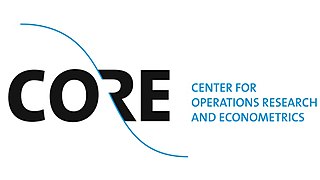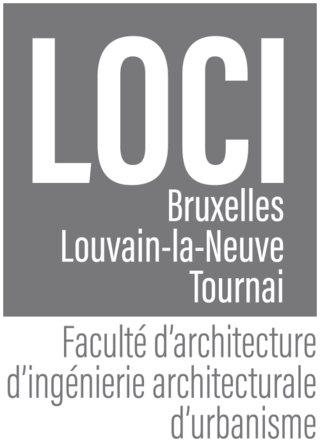
Louvain-la-Neuve is a planned town in the municipality of Ottignies-Louvain-la-Neuve, Wallonia, Belgium, situated 30 km southeast of Brussels, in the province of Walloon Brabant. The town was built to house the Université catholique de Louvain (UCLouvain) which owns the entire territory of the town; following the linguistic quarrels that took place in Belgium during the 1960s, and Flemish claims of discrimination at the Catholic University of Leuven, the institution was split into the Dutch language Katholieke Universiteit Leuven, which remained in Leuven, and the Université catholique de Louvain.

UCLouvain is Belgium's largest French-speaking university and one of the oldest in Europe. It is located in Louvain-la-Neuve, which was expressly built to house the university, and Brussels, Charleroi, Mons, Tournai and Namur. Since September 2018, the university uses the branding UCLouvain, replacing the acronym UCL, following a merger with Saint-Louis University, Brussels.

The Louvain School of Management is the international business school of the University of Louvain (UCLouvain), Belgium, founded in 1897. The faculty offers courses on the campuses of Louvain-la-Neuve, UCLouvain FUCaM Mons and UCLouvain Charleroi.
Claroline is an open-source collaborative eLearning and eWorking platform, operating under the GPL open-source license. It enables organizations to develop and manage courses and collaboration spaces online. Used extensively in educational institutions and by enterprises for data sharing, it boasts availability in around 100 countries and supports 35 languages

UCLouvain Saint-Louis Brussels is an autonomous university campus specialized in social and human sciences part of UCLouvain and based in Brussels, Belgium.

The Old University of Leuven is the name historians give to the university, or studium generale, founded in Leuven, Brabant, in 1425. The university was closed in 1797, a week after the cession to the French Republic of the Austrian Netherlands and the principality of Liège by the Treaty of Campo Formio.

Michel Weber is a Belgian philosopher. He is best known as an interpreter and advocate of the philosophy of Alfred North Whitehead, and has come to prominence as the architect and organizer of an overlapping array of international scholarly societies and publication projects devoted to Whitehead and the global relevance of process philosophy.
Orchestre symphonique des Étudiants de Louvain-la-Neuve (OSEL) is a Belgian symphony orchestra based in Louvain-la-Neuve, Wallonie, and mainly composed of students from the University of Louvain (UCLouvain).
A theme-based shared flat is a concept created by the University of Louvain (UCLouvain) which consists of between six and twelve students sharing a "kot" and working together on a project. The project lasts for one academic year and can embrace cultural, social or humanitarian activities. There is a total of about 130 KàPs in Belgium gathering more than 1000 students. Some KàPs have a room reserved for exchange students only.
Louvain Coopération is a Belgian International non-governmental organization (INGO) located in the university city of Louvain-la-Neuve. This organization is a member of the Federation of Development Cooperation NGO (Acodev). The NGO was founded by members of the University of Louvain (UCLouvain) and is an important part of the Belgian universities NGO grouping (Uni4coop), It operates on an annual budgetary basis of around €8 million, and is active in about 40 projects distributed in nine countries of the world, if you count Belgium. Its fields of activity are: health, including mental health and in specific gender-related contexts, food security, microeconomy, mutual organization and international solidarity.

The Center for Operations Research and Econometrics (CORE) is an interdisciplinary research institute of the University of Louvain (UCLouvain) located in Louvain-la-Neuve, Belgium. Since 2010, it is part of the Louvain Institute of Data Analysis and Modeling in economics and statistics (LIDAM), along with the Institute for Economic and Social Research (IRES), Louvain Finance (LFIN) and the Institute of Statistics, Biostatistics and Actuarial Sciences (ISBA).

UCLouvain Bruxelles Woluwe, also known as Louvain-en-Woluwe or Alma, is a campus of the University of Louvain in Brussels, Belgium. The campus, built in the 1970s following the Leuven crisis, houses the Faculties of Medicine and Dentistry, Pharmacy and Biomedical Sciences and of Public Health, the Cliniques universitaires Saint-Luc, the university's main academic hospital, as well as many other institutions of higher education and a vast sports complex.

The Musée L or Musée universitaire de Louvain, French for: Louvain University Museum, is a Belgian university museum of the University of Louvain (UCLouvain) located in Louvain-la-Neuve, Walloon Brabant, Belgium.

The Marie Haps Faculty of Translation and Interpreting is a faculty of Saint-Louis University, Brussels (UCLouvain) located on its own campus in Brussels' European Quarter, in the municipalities of Ixelles and the City of Brussels. It is Belgium's oldest translation school, founded in 1955, and the fifth faculty of Saint-Louis University, Brussels, which it fully merged with in 2015.

UCLouvain Charleroi is a campus of the University of Louvain in Charleroi, Belgium. Consisting of 3 faculties and a series of research centers and institutes, UCLouvain Charleroi consists of the Maison Georges Lemaître, in the center of the city, and a branch in Montignies-sur-Sambre.

The Faculty of Economic, Social and Political Sciences and Communication (ESPO) is a faculty of the University of Louvain, located on the campuses of Louvain-la-Neuve, FUCaM Mons and UCLouvain Charleroi. It originates in the School of Political and Social Sciences founded by Jules Van den Heuvel in Louvain in 1892. With over 6000 students, it is UCLouvain's largest faculty.

The Aula Magna is a postmodern building of the University of Louvain located in Louvain-la-Neuve, a section of the Belgian city of Ottignies-Louvain-la-Neuve, in Walloon Brabant. It holds one of the country's largest auditoria, with a maximum capacity of 1050 seats, and Wallonia's largest stage. Inaugurated in 2001, the complex was designed by Philippe Samyn.

The Louvain-la-Neuve Cyclotron is a brutalist architectural complex of the University of Louvain built from 1970 to 1972 in Louvain-la-Neuve, Walloon Brabant, Belgium, notably holding UCLouvain's CYCLONE particle accelerators. It is the first building completed by the university when it moved following the Leuven crisis and was the largest cyclotron in Europe at the time of its construction. The Louvain Cyclotron can also refer to Belgium's first cyclotron built in Louvain (Leuven) in 1947, which was replaced by the Louvain-la-Neuve center.

The Louvain School of Engineering or École polytechnique de Louvain (EPL) is a faculty of the University of Louvain, Belgium, founded in 1864. Known as the Faculty of Applied Sciences prior to 2008, it currently operates on the campuses of Louvain-la-Neuve and UCLouvain Charleroi.

The Faculty of Architecture, Architectural Engineering and Urban Planning, often called LOCI, is the 14th faculty of the University of Louvain, Belgium. It became an independent faculty in 2009, with the merger of three institutes founded between 1867 and 1882, and is active in Brussels (Saint-Gilles), Tournai and Louvain-la-Neuve.












